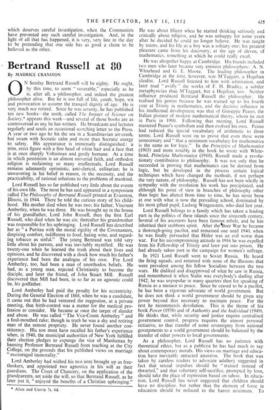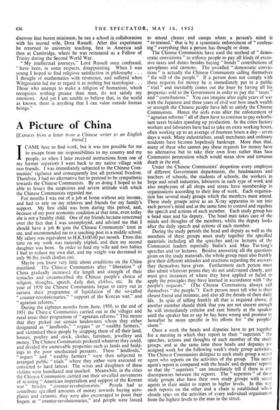Bertrand Russell at 80
By MAURICE CRANSTON
ON Sunday Bertrand Russell will be eighty. He ought, by this time, to seem "venerable," especially as he is, after all, a 'philosopher, and indeed the greatest philosopher alive. But he is too full of life, youth, hope, wit and provocation to assume the tranquil dignity of age. He is very much not retired. Since he was seventy, he has published ten new books—the tenth, called The Impact of Science on Society,* appears this week—and several of those books are as controversial as any he has written. He broadcasts and lectures regularly and sends an occasional scorching letter to the Press. A year or two ago he hit the sea in a Scandinavian air-crash, but swam with Socratic calm and more than Socratic energy to safety. His appearance is immensely distinguished: a trim, erect figure with a fine head of white hair and a face that is at once sharply Voltairean and gently humane. At a time in which pessimism is an almost universal faith, and orthodox religion is reclaiming so many intellectuals, Lord Russell remains adamantly optimistic, anti-clerical, utilitarian; he is unwavering in his belief in reason, in the necessity, and the practicability, of rational solutions to the problems of mankind.
Lord Russell has so far published very little about the events of his own life. The most he has said appeared in a symposium called The Philosophy of Bertrand Russell printed at Evanston, Illinois, in 1944. There he told the curious story of his child- hood. His mother died when he was two; his father, Viscount Amberley, when he was three. He was brought up in the house of his grandfather, Lord John Russell, then the first Earl Russell, who died when he was six; thereafter his grandmother was responsible for his upbringing. Lord Russell has described her as "a Puritan with the moral rigidity of the Covenanters, despising comfort, indifferent to food, hating wine, and regard- ing tobacco as sinful." The young Bertrand was told very little about his parents, and was inevitably mystified. He was twenty-one when he learned the truth about their lives and opinions, and he discovered with a shock how much his father's experience had been the analogue of his own. For Lord Amberley, too, had been a man of unorthodox beliefs. He had, as a young man, rejected Christianity to become the disciple, and later the friend, of John Stuart Mill. Russell discovered that Mill had been, in so far as an agnostic could be, his godfather.
Lord Amberley had paid the penalty for his eccentricity. During the General Election of 1868, when he was a candidate, it came out that he had ventured the suggestion, at a private meeting, that birth-control was a matter for the medical pro- fession to consider. He became at once the target of slander and abuse. He was called "The Vice-Count Amberley" and a foul-mouthed rake; though in truth he was a shy and retiring man of the utmost propriety. He never found another con- stituency. His son must have recalled his father's experience when, in 1940, the municipal authorities of New York fulfilled their election pledges to expunge the vice of Manhattan by banning Professor Bertrand Russell from teaching at the City College, on the grounds that his published views on marriage "encouraged immorality."
Lord Amberley had wished his two sons brought up as free- thinkers, and appointed two agnostics in his will as their guardians. The Court of Chancery, on the application of the grandparents, set aside the will, so that Bertrand Russell, as he later put it, "enjoyed the benefits of a Christian upbringing."
* Allen and Unwin 7s. 6d.
He was about fifteen when he started thinking seriously and critically about religion, and he was unhappy for some years after he decided he could no longer believe. He was taught by tutors, and his life as a boy was a solitary one; his greatest pleasure came from his discovery, at the age of eleven, of mathematics, something at which he could really excel.
He was altogether happy at Cambridge. His friends included two men who later became very eminent philosophers : A. N. Whitehead and G. E. Moore. The leading philosopher in Cambridge at the time, however, was M'Tageart, a Hegelian idealist. Lord Russell listened to him with admiration, and later read " avidly " the works of F. H. Bradley, a subtler metaphysician than M'Taggart, but a Hegelian, too. Neither influence produced Bertrand Russell the philosopher. He realised his genius because he was trained up to his fourth year at Trinity in mathematics, and the decisive influence in his intellectual development was that of Giuseppe Peano, the Italian pioneer of modern mathematical theory, whom he met in Paris in 1900. Following that meeting, Lord Russell mastered Peano's symbolism and then evolved his own. Peano had reduced the special vocabulary of arithmetic to three terms; Lord Russell went on to prove that even these were unnecessary and "that a minimum vocabulary for mathematics is the same as for logic." In the Principles of Mathematics (1903) and more notably in the book he wrote with White- head, Principia Mathematica (1910), Russell made a revolu- tionary contribution to philosophy. It was not only that he succeeded in proving that mathematics can be derived from logic, but he developed in the process certain logical techniques which have changed the methods, if not perhaps the very nature, of philosophy. Russell has not been wholly in sympathy with the revolution his work has precipitated, and although his point of view in branches of philosophy other than logic has altered from time to time, he has never been at one with what is now the prevailing school, dominated by his most gifted pupil, Ludwig Wittgenstein, who died last year.
Lord Russell belongs to a family which has taken a leading part in the politics of these islands since the sixteenth century. Several of his ancestors have been famous rebels, and he has inherited their stubborn spirit. After thetoer War he became a thorough-going pacifist, and remained one until 1940, when he was finally persuaded that Hitler was an evil worse than war. For his uncompromising attitude in 1916 he was expelled from his Fellowship of Trinity and later put into prison. He had already taken part in the campaign for women's suffrage.
In 1921 Lord Russell went to Soviet Russia. He heard the firing squads, and returned with none of the illusions that were prevalent among his fellow Socialists between the two wars. He disliked and disapproved of what he saw in Russia. and remembered it when Stalin was everybody's darling after 1942; he was unpopular in many quarters then for speaking of Russia as a menace to peace. Since he ceased to be a pacifist, he has been a vigorous advocate of world government. But he does not think a world government should be given any power beyond that necessary to maintain peace. For the rest he recommends devolution. This is the theme of his book Power (1938) and of Authority and the Individual (1949). He thinks that, while security and justice require centralised government control, progress requires the utmost personal initiative, so that transfer of some sovereignty from national gover,nments to a world government should be balanced by the transfer of other powers to local governments.
As a philosopher, Lord Russell has no patience with theoretical ethics, but as a publicist he has had much to say about contemporary morals. His views on marriage and educa- tion have inevitably attracted attention. The book that was taken by careless readers to advocate adultery suggested in fact that sexual impulses should be "trained instead of thwarted," and that voluntary self-sacrifice, prompted by love, should take the place of repression based on taboo. In educa- tion, Lord Russell has never suggested that children should have no discipline, but rather that the element of force in education should be reduced to the barest minimum. To discover that barest minimum, he ran a school in collaboration with his second wife, Dora Russell. After this experiment he returned to university teaching, first in America and then at Cambridge, where he was reinstated as a Fellow of Trinity during the Second World War.
"My intellectual journeys," Lord Russell once confessed, "have been, in some respects, disappointing. When I was young I hoped to find religious satisfaction in philosophy . . . I thought of mathematics with reverence, and suffered when Wittgenstein led me to regard it as nothing but tautologies . . . Those who attempt to make a religion of humanism, which recognises nothing greater than man, do not satisfy my emotions. And yet I am unable to believe that, in the world as known, there is anything that I can value outside human beings."



































 Previous page
Previous page